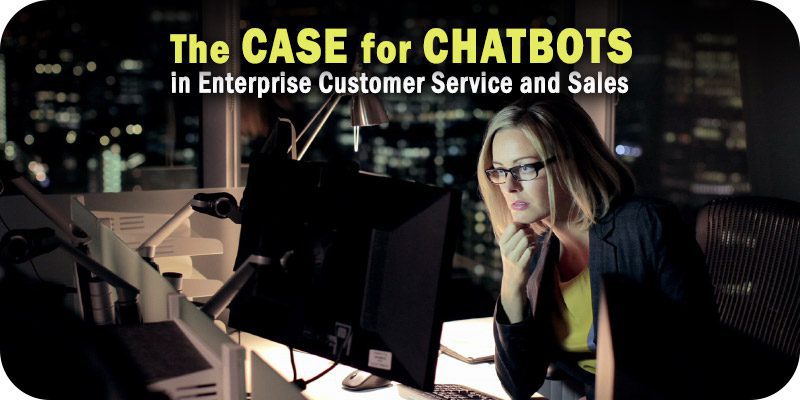The Case for Chatbots in Enterprise Customer Service and Sales


As part of Solutions Review’s Contributed Content Series—a collection of articles written by industry thought leaders in maturing software categories—Darshan Shah, a Director at ISG, explains how chatbots can help enterprise customer service and sales teams improve user and employee experiences.
Chatbots are a type of automation trained to answer questions. Most e-commerce websites have implemented chatbots, and online shoppers have become accustomed to seeing them appear through a small popup window at the bottom corner of the screen when shopping online. Basic chatbots are developed based on rules that can handle simple tasks like providing product information or answering simple questions.
Complex artificial intelligence (AI)-driven chatbots use natural language processing (NLP) and machine learning to identify customer problems by acting on various inputs. They also provide a more intuitive user interface beyond a simple text-based interaction. These chatbots can deal with far more complex tasks and have become integral members of enterprise customer service and sales functions.
How Chatbots Improve User and Employee Experiences
Currently, chatbots are used primarily in customer service and sales, where they can make a significant difference. Delivering a superior customer experience is a key differentiator, and chatbots help customers find the quick solutions and personalized help they need to improve their experience.
Chatbots for customer service can help businesses engage customers by answering frequently asked questions and adding context to conversations. Businesses improve user experience by shortening response times and the first-attempt-to-resolution rate while also improving call center agent experience by freeing them from spending excessive amounts of time answering simple, repetitive questions so they can focus on solving more complex issues.
How Chatbots Provide Customer Support
Enterprises also turn to chatbots when they need to provide support 24/7 across multiple languages or use a single messaging system across various platforms. When implemented as part of the customer service function, bots can manage volume overflow when support agents are busy or unavailable, handle queries from website visitors for technical support or information on specific products or services, and answer billing, pricing, order, and shipping questions.
Customer-facing enterprises need refund and exchange policies as a general rule of business. Chatbots can pull from those policies to handle common queries, reducing support tickets and increasing team productivity, mainly when companies make the option to ”get a refund or exchange” visible right on the chat window.
Similarly, order confirmation and shipment tracking are valuable to customers after they purchase. Bots can handle routine inquiries, with the customer support team getting involved to handle exceptions and more complex problems. To collect customer feedback, chatbots can generate a high degree of engagement with customer surveys, providing a vital communication loop for both companies and customers.
Chatbots are increasingly being integrated into mobile apps to provide users with on-the-go support that does not require them to use other channels. Using conversational AI for in-app support increases user engagement by addressing queries inside the app, providing real-time answers to simple questions and immediate customer service, and personalizing interactions to improve user experience.
One item to consider is the need for a warm handoff between the chatbot and a human in case the customer cannot resolve their issue or question with the chatbot. Failing to include this as part of your automated solution leads to frustrated customers who will negatively perceive the interaction.
Bots also have an essential role in internal customer service, where they can address self-help support, raise tickets or direct urgent requests to a live agent. Many IT helpdesk tickets require the extraction of multiple complex entities from the ticket and the use of RPA to perform backend functions. With the help of a strong IT service handbook or knowledge base designed for your organization, bots can act as AI assistants on an enterprise customer service helpdesk. They can be trained to fully resolve service requests or perform pre-processing to assist a human agent in resolving the ticket.
Beyond Customer Support to Sales Support
Chatbots can also assist businesses in asking relevant questions, qualifying leads, and scheduling sales meetings on a large scale. Bots can interact with online visitors 24 hours a day, seven days a week, to generate more leads, handle online orders on time, and provide personalized services by making product recommendations based on previous purchases.
Lead generation chatbots can provide exceptional conversational experiences for website visitors while qualifying them on a large scale. The leads can then be routed to the appropriate sales representative for immediate closing or appointment scheduling. Chatbots can also enable automated appointment booking, allowing customers to book appointments directly from a website or Facebook page. This is particularly common in the hospitality, health care, and personal services industries.
Beyond customer and sales support, chatbots have essential roles in HR and marketing across various industries. By enabling enterprises to manage large volumes of interactions at a lower cost, chatbots free the business to engage leads and customers without the need for additional staff.





















